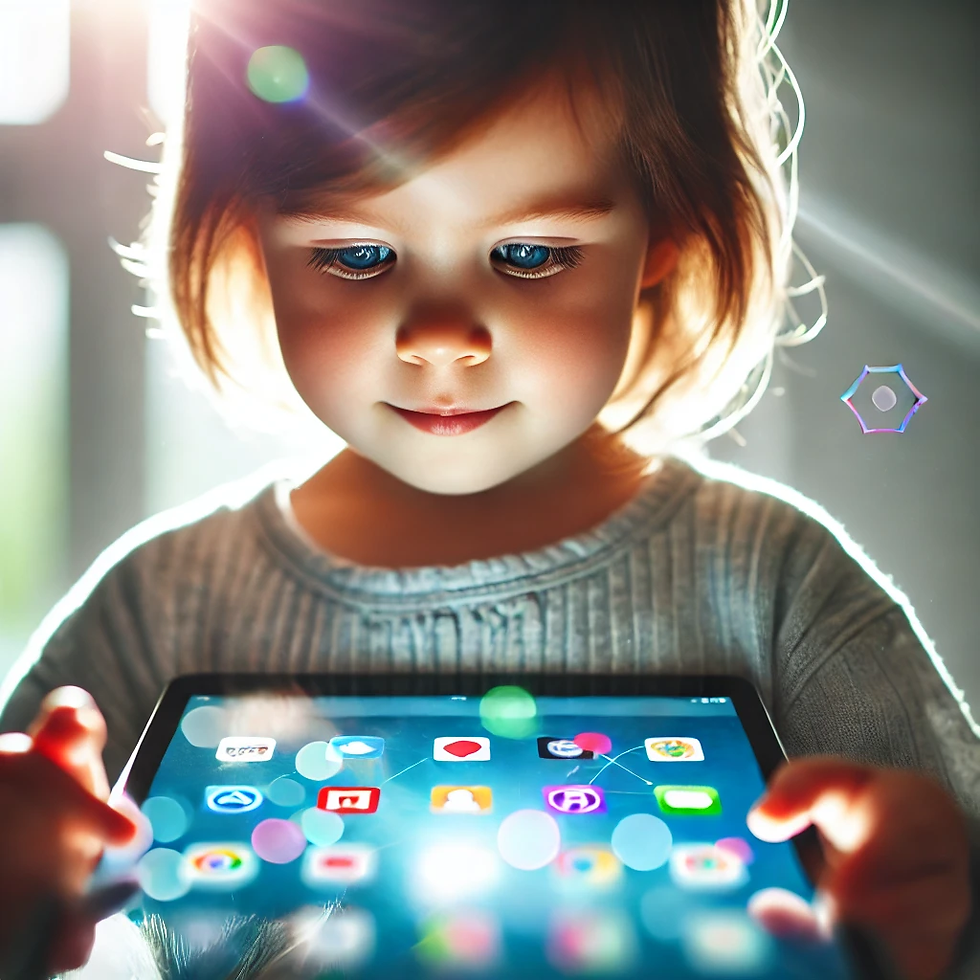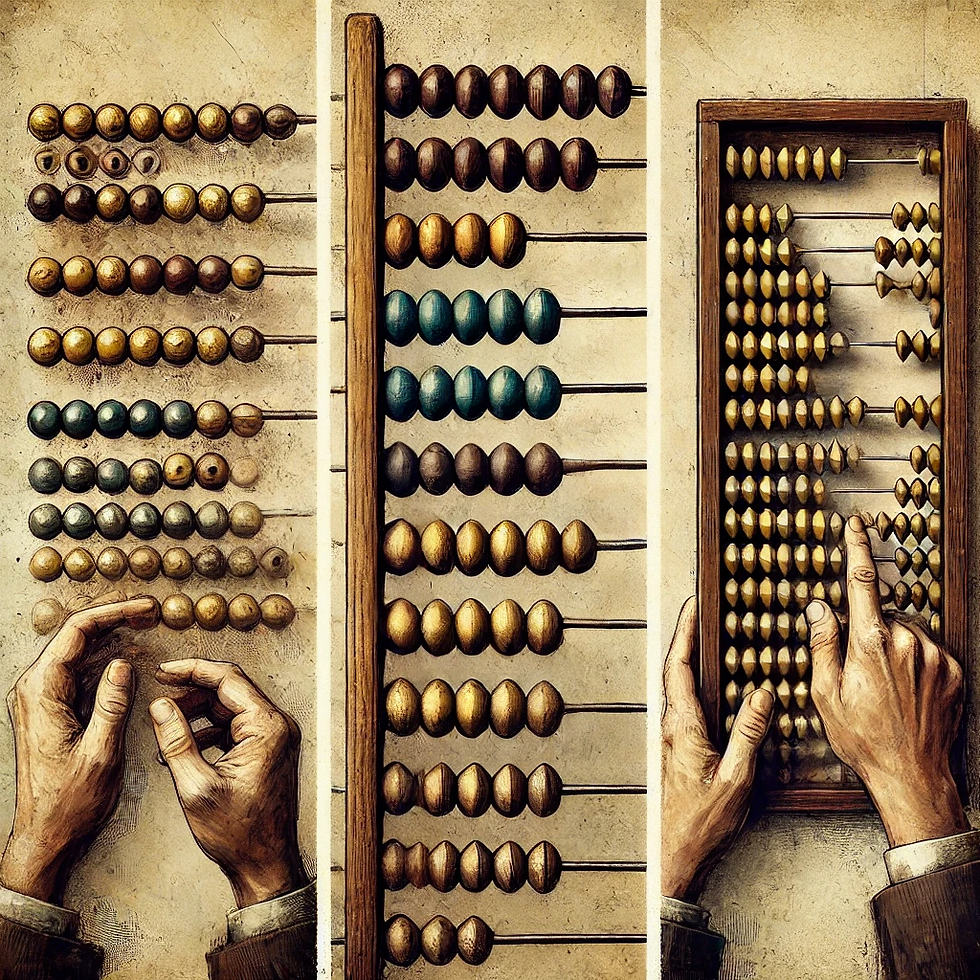Redefining Expertise: How AI Changes the Starting Line Without Redrawing the Finish Line
- jevanclief1
- Jan 6
- 6 min read
In the 1980s, using a computer meant knowing command-line interfaces, troubleshooting hardware, and writing basic programs - tasks that took experts months or years to master.
Even sending an email required understanding protocols and command syntax

Today, children navigate complex digital environments with intuitive ease.
That evolution didn’t eliminate the need for computer science experts—it redefined what we consider basic digital literacy.
The same evolution is happening now with artificial intelligence.
Tasks once requiring expert skill—drafting essays, analyzing data, generating designs—are becoming automated and accessible. But this doesn’t mean expertise is disappearing.
A crucial distinction must be made between traditional tools and modern AI, one that fundamentally changes how we think about technological progress with them.
GenAI (and the tools people are creating with it) is not just another tool like a calculator or a word processor—it represents the latest layer in a long history of tools that have abstracted complexity and expanded human potential.
Before the calculator, there were slide rules, abacuses, and even ancient tallying systems. Each of these tools simplified specific tasks, allowing us to focus on more complex problems.

The abacus turned raw counting into structured arithmetic; the slide rule made logarithmic calculations intuitive; The slide rule made logarithmic calculations intuitive; what once took hours of manual computation could be solved in minutes, enabling engineers to design increasingly complex systems in less time.
Calculators, in turn, automated arithmetic entirely, paving the way for engineers and scientists to explore realms of mathematics far beyond routine computation.
Before even the abacus or slide rule, the clay tablets of ancient Mesopotamia marked one of humanity’s earliest tools for abstraction—capturing numbers, transactions, and records in physical form.
Writing itself was a revolutionary abstraction of information, freeing knowledge from the limitations of memory and enabling it to be shared, stored, and expanded across generations.
These tablets represented humanity's first attempt to externalize memory and standardize knowledge transfer - a revolutionary concept that would shape civilization itself.
Writing didn't just preserve information; it created a feedback loop where each generation could build upon the accumulated knowledge of their ancestors, accelerating human progress exponentially.

This shift wasn’t limited to mathematics or economics—it applied to every domain of human knowledge.
Writing allowed storytelling to evolve into literature, oral traditions to become codified religions, and scattered observations to form the basis of scientific inquiry.
Each tool in this lineage of abstraction, whether a clay tablet, calculator or digital camera, served not to replace human skill but to amplify the possibilities of what we could achieve with the information we now had the means to harness.
GenAI continues this tradition, not within a single field but across every domain touched by information.
It takes the abstracting power of these earlier tools and expands it to realms of creativity, communication, and collaboration that we are only beginning to explore.
What’s remarkable is that each of these tools didn’t just solve problems—they created new layers of abstraction that allowed humans to build entire disciplines atop their functionality.
Calculators didn’t eliminate arithmetic; they elevated it, enabling fields like aerospace engineering and cryptography to flourish.
In the same way, GenAI abstracts tasks like drafting, designing, and analyzing, providing a new foundation on which we can create, explore, and innovate.
It doesn’t just handle the work—it reframes what the work itself can become, reshaping creative and intellectual landscapes just as every transformative tool before it has done.
But here in lies an issue that many are fearful about.
The key difference is that while calculators automated computation, AI shows potential for automating aspects of creative mathematical thinking - discovering patterns, forming conjectures, and even suggesting proofs or even further, that companies will value AI over a mathematician in doing this.
This raises deeper questions about the nature of creativity itself.

So the question must be asked, is human creativity going to be able to expand with the technology and “know how” of AI or will it lag behind and be replaced?
This is where my very strong opinion comes in.
I am extremely Pro-Human (which seems like a counterintuitive statement despite my evangelizing of Ai in most of my posts)
Humans have always created amazing levels of abstraction regardless of what we see, have, or do in our outside environments.
Human creativity is boundless and can produce novel ideas that defy existing patterns.
More importantly it is limitless and not easily quantified by algorithms.
And this is where I think the debate finds its core issue.
The Best vs Creative Problem
Creativity isn't about perfection or optimization; it's about creating something that resonates uniquely with another being or doing things in a way that go against the standardized hierarchies of “Best Practice”
When we talk about 'best' in creative fields, we're really talking about impact and resonance.
Shakespeare isn't considered great because he followed rules perfectly, but because he broke them in ways that continue to move humans centuries later.
What fascinates me most is how this evolution forces us to reconsider what “expertise” means, especially in fields where there is no “best.”
In creative industries, the concept of “best” dissolves into subjectivity.
There’s no objective metric to crown the greatest artist, the most insightful political theorist, or the most profound writer.
Humans decide who is the best subjectively within their lives and lived experiences, This is where we as humans have always fallen short (if we didn't we would all conclusive follow the “best” religion, economic, or political system…but we don't) and so to this is where AI will always fall short (for now).
It can generate, replicate, and refine, but it cannot understand or define the undefinable much in the same way we cannot.
Creativity lies in its subjectivity, in the way it invites endless exploration, and in the fact that “better” and “best” are concepts that don’t quite fit.

This subjectivity shows human creativity remains irreplaceable, even as AI continues to advance and perhaps we will see this same limitation (or currently do) within AI systems now.
Humans excel in recognizing when to pivot, understanding diminishing returns, and bringing fresh perspectives to problem-solving.
At the heart of expertise is judgment—understanding why and when to perform certain tasks.
AI can process information at incredible speeds, but it lacks the ability to know when to stop or when to take a different path often (this could certainly, and most likely will, get better with time so take that with a grain of salt).
Educators, in particular, embody this ability. Teachers guide students not just in what to learn but in how to think and when to pivot. They shape curiosity and foster creativity, encouraging exploration even in the face of uncertainty.
At Eduba, we’ve embraced this philosophy. We’re building tools that amplify human creativity and judgment, not replace them.
Our platforms empower educators to explore, iterate, and engage students in ways that reflect the soul of education.
Teachers don't just transmit information - they cultivate wisdom. They help students develop the metacognitive skills to know not just what to learn, but why and how to learn, a uniquely human capability that AI can support but cannot replace in the same way.
This isn’t about efficiency for efficiency’s sake—it’s about discovery, connection, and unlocking human potential.

As AI raises the baseline of expertise, the role of human creativity becomes even more vital. Tools that automate routine tasks give us the freedom to imagine what comes next.
They don’t replace our ability to innovate; they challenge us to think bigger, to go beyond the baseline, and to redefine the limits of what we thought was possible.
I have faith that humans will continue to do what we’ve always done: find new ways to elevate and redefine what’s possible.
Perhaps I’ll be proven mistaken someday, but until then, I remain optimistic about human creativity.
AI tools are redefining what we consider the baseline for expertise, but they aren’t replacing it—they’re creating room for us to focus on deeper, more meaningful work.
Programming has moved from assembly languages to no-code platforms. Design tools generate visuals from prompts. AI drafts essays and automates data analysis.
But the demand for expertise hasn’t disappeared; it’s shifted.
Programmers now focus on system architecture and innovation.
Designers shape brand identities and tell visual stories.
Writers craft narratives that resonate in ways AI cannot replicate because it is more than what is written that creates a narrative.
This is the future I believe in—a future where human creativity thrives, where judgment and exploration define expertise.
Where the infinite, is truly in-finite.




Comments